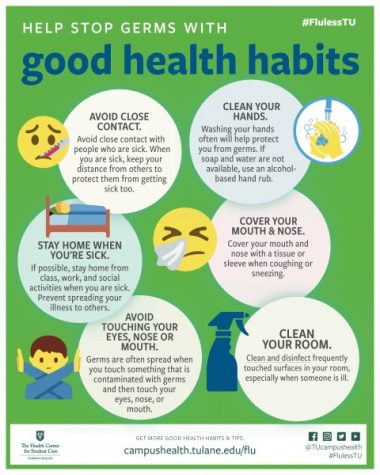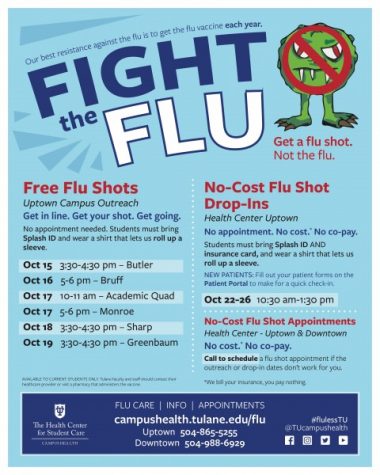The Freshman Plague: What students are doing to stay healthy

Courtesy of Tulane University Campus Health
“Achoo!” your roommate exclaims.
He’s coughing and sneezing, but he doesn’t seem that bad, or so you think. You don’t think much of this, and you continue to interact with him as you normally do. “It can’t be that bad,” you reassure yourself.
That’s what freshman Andrew Lomuscio thought. Fast forward a week later — now he’s sick too. Now he’s the one coughing and feeling feverish. Sound familiar?
Other freshmen gave a similar account.
“There’s a number of reasons [I got sick],” freshman Max Weber said. “I think my roommate was sick, but I didn’t actually get sick until like a week and a half after that.”
Lomuscio and Weber have both been affected by what some Tulane students refer to as the “freshman plague.”

Do a quick google search of the term “freshman plague,” and you’ll learn this supposed phenomenon is not an uncommon occurrence. College publications at Duke University, Wake Forest University and The College of William and Mary have covered the “freshman plague,” using it to describe outbreaks of diseases like the common cold and the flu freshmen get afflicted with during their first semester as they acclimate to their new surroundings.
According to Daniel Garrett, the Medical Director of Tulane University Health Center, an increase in sickness seen in the freshmen is common due to the living conditions of the incoming class.
“Freshmen living in residence halls and communal areas are more often exposed to colds, viruses, illnesses, thus they are more susceptible to developing illnesses,” Garrett said.
The “freshman plague,” however, doesn’t just target freshmen.
“When I came here everybody got sick, and I feel like it’s not just a freshmen thing,” sophomore Jackson Arnold said. “It’s a whole school-wide thing.”
According to Garrett, though more freshmen than students in other grades come to The Health Center, pinning the plague on freshmen is not entirely fair.
“[The ‘Freshman Plague’] is not an accurate term,” Garrett said. “This is a facet of living in communal areas and sharing ‘germs’ — mainly viruses — amongst each other. In reality, this is an opportunity for a person’s immune system to develop appropriate responses to routine illnesses.”

Regardless of students’ year, this time of the year is a common time of illness for everyone. Cold season begins in late August or early September, and flu season starts in October. Instances of both remain high through March.
Garrett recommends taking preventative measures, including good hygiene. Flu vaccines are also a good way to stay healthy, according to the Centers for Disease Control and Prevention.
“While vaccine effectiveness can vary, recent studies show that flu vaccination reduces the risk of flu illness by between 40 percent and 60 percent among the overall population during seasons when most circulating flu viruses are well-matched to the flu vaccine,” the CDC website states.
The Health Center will provide free flu shots starting Oct. 15 at various locations around campus. Refer to the poster for exact times and locations.
Your donation will support the student journalists of Tulane University. Your contribution will allow us to purchase equipment and cover our annual website hosting costs.
















Leave a Comment